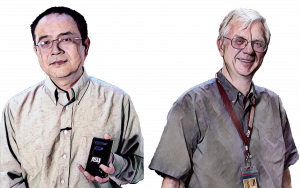 The Journal of The Electrochemical Society is publishing a focus issue dedicated to the late Professor Nongjian Tao for his longstanding contribution to the development of chem/biosensors and nanoscale measurements. This issue also serves as a celebration of the 70th birthday of Professor Stuart Lindsay, Professor Tao’s doctoral advisor and longtime collaborator for over 35 years.
The Journal of The Electrochemical Society is publishing a focus issue dedicated to the late Professor Nongjian Tao for his longstanding contribution to the development of chem/biosensors and nanoscale measurements. This issue also serves as a celebration of the 70th birthday of Professor Stuart Lindsay, Professor Tao’s doctoral advisor and longtime collaborator for over 35 years.
Contributions are invited in all aspects of chem/biosensor technology with topics that include, but are not limited to: Electric, magnetic, and optical biosensors; novel transduction modes; molecular recognition elements; nanomaterials and their system level integration for biological/medical applications such as point-of-care, implantable, and wearable sensors. In addition, novel nanoscale measurements of cells and cellular/molecular components (e.g., nucleic acid, proteins, organic molecules), including scanning probe microscopy, plasmonic, and optical imaging of biomolecules, are also highly encouraged. Many of these measurements lead to improved understanding of transduction mechanisms and novel biosensor platforms that allow for ultrasensitive and dynamic detection in living systems.
Although this focus issue is linked to the 240th ECS Meeting symposium, Biosensors and Nanoscale Measurements: A Symposium in Honor of Professors Nongjian Tao and Stuart Lindsay, this focus issue is open to everyone. Interested authors may submit review, critical review, perspective, methods, and original research articles.
Accepting submissions: October 7, 2021 | Submission deadline: January 5, 2022
(When submitting, indicate that the paper is intended for the Focus Issue on Biosensors and Nanoscale Measurements: In Honor of Nongjian Tao and Stuart Lindsay)
Guest Editors
Larry Nagahara, John Hopkins University, U.S. | larry.nagahara@jhu.edu
Erica Forzani, Arizona State University, U.S. | Erica.Forzani@asu.edu
Jin He, Florida International University, U.S. | jinhe@fiu.edu
Tianwei Jing, Biosensing Instruments, Inc., U.S. | jing709@gmail.com
Jessica Koehne, NASA Ames Research Center, U.S. | jessica.e.koehne@nasa.gov
Chenzhong Li, Tulane University, U.S. | cli28@tulane.edu
Patrick Oden, Texas Instruments, Inc., U.S. | p-oden1@ti.com
Shaopeng Wang, Arizona State University, U.S. | Shaopeng.Wang@asu.edu
Nick Wu, University of Massachusetts, U.S. | nianqiangwu@umass.edu
Bingqian Xu, University of Georgia, U.S. | nanoxu@uga.edu
Peiming Zhang, Arizona State University, U.S. | Peiming.Zhang@asu.edu
Technical Editor
Ajit Khosla, Yamagata University, Japan | khosla@yz.yamagata-u.ac.jp
Associate Editors
Michael Adachi, Simon Fraser University, Canada | mmadachi@sfu.ca
Netz Arroyo, Johns Hopkins University School of Medicine, U.S. | netzarroyo@jhmi.edu
Thomas Thundat, University at Buffalo, U.S | tgthunda@buffalo.edu
Editor-in-Chief
Robert Savinell, Case Western Reserve University, U.S. | rfs2@case.edu
Articles are published in a standard issue of the journal as they are accepted. If selected at submission, accepted papers are published online in the ECS Digital Library on IOPscience within 24 hours of scheduling for publication. The version of record is published online within approximately 10 days of final acceptance.
Visit the ECS website for author submission instructions and requirements for each article type.
OPEN ACCESS: Authors choosing to publish open access agree to pay an article processing charge (APC) if their papers are accepted. APCs are discounted by 75 percent for ECS members and waived for authors from ECS Plus subscribing institutions. Check if your institution subscribes to ECS Plus. Discounts are applied at the time of payment.


